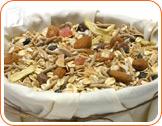Studies suggest there is a link between menopause and a change in cholesterol levels. Premenopausal years - the time before menopause - have higher levels of estrogen. This hormone maintains healthy levels of HDL, the good cholesterol. At the same time, it helps suppress levels of LDL, the bad cholesterol.

This arrangement changes, however, when a women enters menopause. Lower levels of estrogen mean that LDL is able to rise by as much as 10%, while the hormonal change has an inverse effect on HDL. This discovery explains the increased risk of heart disease in postmenopausal women.
This may seem like grim news, but there are certain steps you can take to guard your heart health during and after menopause.
What Can I Do to Combat Heart Disease?
These heart-healthy habits are known for cutting cholesterol:
Eat oatmeal every morning

This versatile breakfast staple can be prepared in many ways. It's best to eat coarse oats rather than instant packets. Top it with fruit to boost your fiber intake even more.
Have oily fish
Now that breakfast is covered, focus on a heart-healthy lunch and dinner. Sea food like salmon, tuna, and mackerel are excellent choices. These oily fishes are rich in omega-3 fatty acids, which can stop blood clotting and reduce your risk of a heart attack.
Start an aerobics routine
Exercise is another tool to help you keep your blood pressure down. Any activity that raises your heart rate and keeps it there for a significant period of time counts as cardiovascular exercise. Running, jogging, walking, and cycling are all good ways to achieve a cardio workout.
Take supplements

In addition to fiber and fish oil, there are many culinary wonders that can lower cholesterol. If you're looking to reap their benefits, though, you may want to take a supplement instead of struggling to fit all of these foods into your diet. For example, artichoke leaf, garlic, ginseng, and niacin are all good for your heart and can be taken in pill form.
More Information about High Cholesterol during Menopause
In addition to taking these steps to lower your cholesterol, try to limit sodium, red meat, and full-fat dairy products in your heart-healthy diet. Click on the following link to learn more about the different menopause treatments available.
Sources
- BMJ Group. "Menopause: What is it?" Patient Leaflet. 2007.
- Hopkins, Virginia. Lee, John R. M.D. What Your Doctor May Not Tell You About Menopause. New York: Warner Books Inc., 1996.
- Love, Susan M.D. Menopause and Hormone Book. New York: Three Rivers Press, 2003.
- Martin, Raquel. The Estrogen Alternative. Rochester, VT: Healing Arts Press, 2000.


